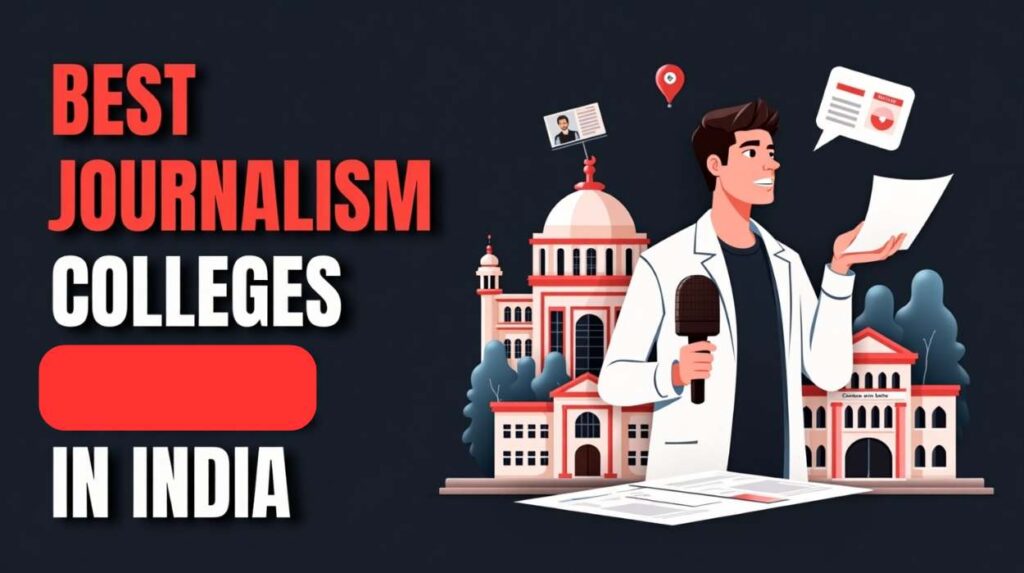In India, the way news is delivered has shifted a lot over the past few decades, moving from just print media to digital platforms, broadcasts on TV, and multimedia reporting. Given the fast expansion of India’s media industry, the demand for talented journalists and professionals is now higher than ever. The choice of an educational institution plays a major role in helping aspiring journalists start their careers in this field. Many of the best journalism colleges in India provide programs that teach the basics as well as give students hands-on experience, exposure to the industry, and training in modern technology based Journalism Colleges.
They are recognized for their academic excellence, supplying the media and business sectors with graduates who do well in newsrooms, TV, digital firms, and corporate communications worldwide. Students need to know what colleges are best for their journalism studies when making this career choice.
Importance of Journalism Education in India
- Quality Foundation Building: Professional journalism courses train students to gather facts, structure their stories well, follow ethics, and apply media law when telling stories in the modern media world.
- Industry Connections: Well-established journalism programs form strong ties with media firms, newspapers, TV channels, and websites, making it possible for students to gain experience, internships, and form useful networks.
- Technology Integration: In journalism training today, using new technologies, social media, data analysis, and multimedia is important because media jobs now rely greatly on digital skills.
- Ethical Standards: Education in journalism teaches ethics, ways to check facts, and the law, all of which support a journalist’s career and credibility.
- Specialization Opportunities: Such programs allow students to focus on areas like investigative journalism, sports journalism, business reporting, and international relations and become experts in them.
- Global Perspective: Having quality journalism education allows students to understand news from different cultures, be aware of trends in the global media, and get ready for a career in the global media industry.
Why These Colleges Rank Highly
- Academic Excellence: The Best Journalism Colleges in India have high academic standards and faculty who mix knowledge from the industry with theory-based lessons.
- Industry Partnerships: They have built strong links with main media companies, so students can take part in guest lectures, workshops, and internships and get help with employment from industry experts.
- Infrastructure Facilities: First-rate colleges spend a lot on advanced equipment such as television studios, radio stations, edit suites, and newsroom simulations where students gain practical experience.
- Placement Records: Graduates of these colleges often land jobs in important media companies, gain good compensation, and go on to build successful careers in several media areas.
- Research Opportunities: These institutions help advance studies by encouraging research in media, communication, and up-and-coming journalism and publishing the results.
- Alumni Network: The networks of alumni in media, government, and corporate jobs regularly offer support, guidance, and career openings to current students and graduates.
Comparison Table
| College Name | Program Types | Fee Range | Placement Highlights |
| Indian Institute of Mass Communication (IIMC) | PG Diploma, Certificate | ₹50,000-₹1,00,000 | 95% placement, Average CTC: ₹8-12 LPA |
| Jamia Millia Islamia | BA, MA, Diploma | ₹15,000-₹50,000 | 90% placement, Average CTC: ₹6-10 LPA |
| Delhi University (Lady Shri Ram College) | BA, MA | ₹20,000-₹40,000 | 85% placement, Average CTC: ₹5-8 LPA |
| Xavier Institute of Communications | PG Diploma, Certificate | ₹80,000-₹1,50,000 | 92% placement, Average CTC: ₹7-11 LPA |
| Symbiosis Institute of Media & Communication | BA, MA, PhD | ₹2,00,000-₹4,00,000 | 88% placement, Average CTC: ₹6-9 LPA |
| Mudra Institute of Communications | PG Diploma | ₹3,00,000-₹5,00,000 | 90% placement, Average CTC: ₹8-12 LPA |
| Asian College of Journalism | PG Diploma | ₹4,50,000-₹6,00,000 | 95% placement, Average CTC: ₹10-15 LPA |
| Indian Institute of Journalism & New Media | Diploma, Certificate | ₹50,000-₹2,00,000 | 80% placement, Average CTC: ₹5-8 LPA |
| Times School of Media | PG Diploma | ₹3,50,000-₹4,50,000 | 87% placement, Average CTC: ₹7-10 LPA |
| Amity School of Communication | BA, MA, PhD | ₹1,50,000-₹3,00,000 | 85% placement, Average CTC: ₹6-9 LPA |
Top 10 Best Journalism Colleges in India
1. Indian Institute of Mass Communication (IIMC), New Delhi
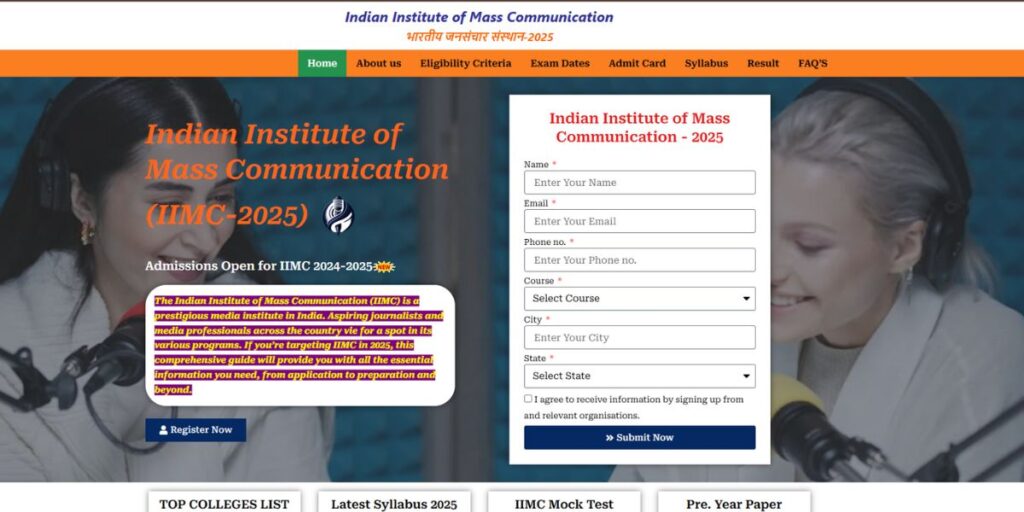
The Indian Institute of Mass Communication is India’s main journalism school and was established by the Ministry of Information and Broadcasting in 1965. IIMC has stayed in the Top Journalism Colleges rankings in India because it offers a well-rounded curriculum, has excellent professors, and has strong links with the media industry. The institute has specialized programs for journalism, radio, television, and advertising, helping students get ready for many media jobs.
Because of its presence in Delhi, Mumbai, Jammu, Kottayam, and Dhenkanal, IIMC offers quality education to students across different regions and keeps the same high standards at all campuses.
Course Highlights:
- Post Graduate Diploma in Journalism (English and Hindi)
- Post Graduate Diploma in Radio and TV Journalism
- Certificate courses in Development Communication
- Specialized programs in Advertising and Public Relations
- Short-term professional development courses
- Research-oriented programs in media studies
Course Fees: Annual fees range from ₹50,000 to ₹1,00,000 for various programs
Admission Process: Entrance exam followed by personal interview and group discussion
Top Recruiters: BBC, CNN-IBN, Times Group, Hindustan Times, NDTV, Doordarshan
2. Jamia Millia Islamia – AJK Mass Communication Research Centre, New Delhi
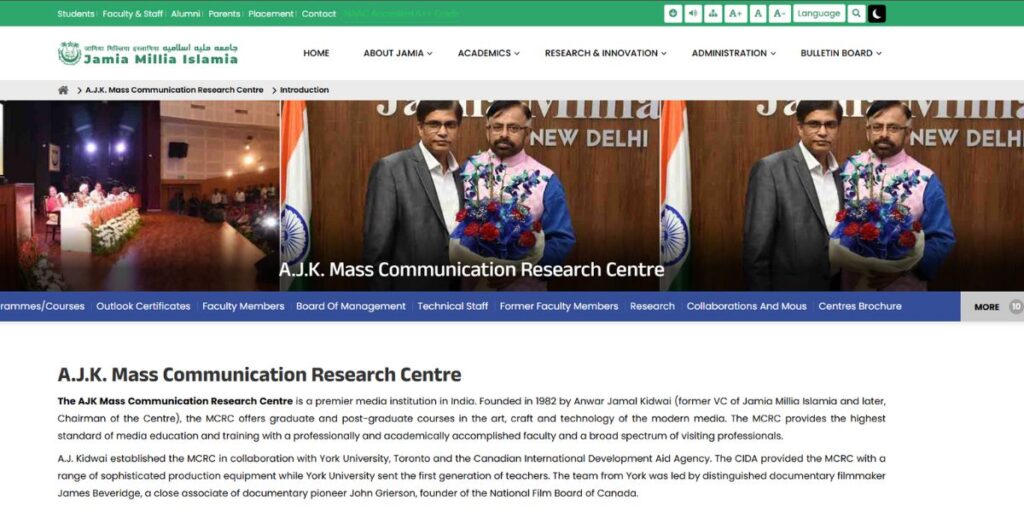
The AJK Mass Communication Research Centre at Jamia Millia Islamia has been recognized as one of the Best Journalism Colleges in India since it was founded in 1982. At the institution, students get both academic knowledge and practical experience, with an extra focus on research and new developments in media studies. Students at the center gain knowledge in journalism, digital tools, making documentaries, and advertising, which prepares them for changes in the media field.
The high number of teachers per student and the modern infrastructure at the institution have helped to create many successful journalists, filmmakers, and media professionals.
Course Highlights:
- Bachelor of Arts in Mass Communication
- Master of Arts in Mass Communication
- Diploma in Mass Communication
- Certificate courses in Video Production
- Research programs leading to M.Phil and PhD
- Convergent journalism and multimedia training
Course Fees: Annual fees range from ₹15,000 to ₹50,000 depending on the program
Admission Process: Merit-based admission through entrance examination and personal interview
Top Recruiters: Al Jazeera, Reuters, Indian Express, Zee Media, Star Network, Outlook Group
3. Lady Shri Ram College for Women, Delhi University
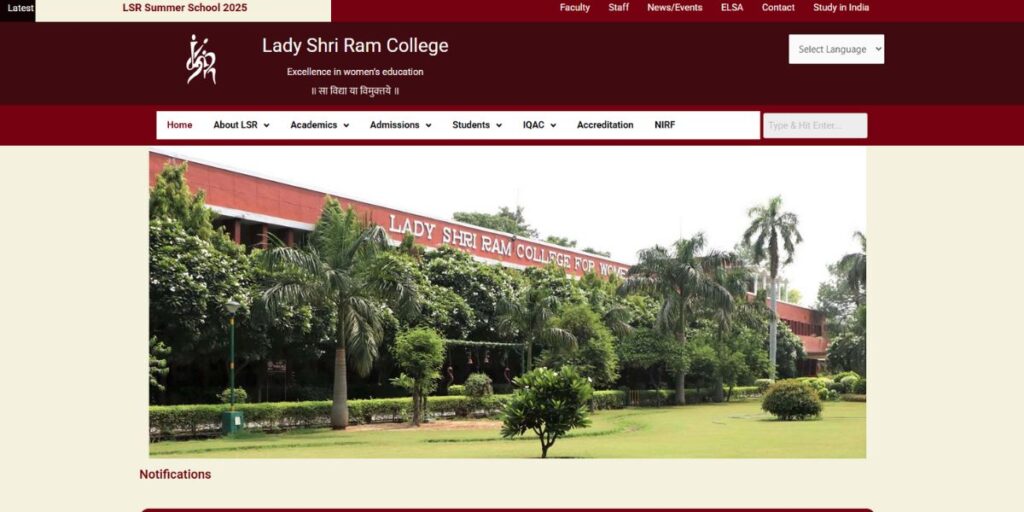
Lady Shri Ram College has become known for being one of the Best Journalism Colleges in India due to its focus on providing women with outstanding journalism education. It uses the notable Delhi University program and new teaching ways to make sure female journalists are confident and capable. It covers critical thinking, ethical journalism, and gender issues so that students learn to deal with current social issues in the media world.
Since LSR offers great facilities, qualified professors, and strong connections with industry, its graduates achieve success in print, broadcast, and digital media and always maintain the highest standards.
Course Highlights:
- Bachelor of Arts (Honours) in Journalism
- Master of Arts in Journalism and Mass Communication
- Certificate courses in Media Studies
- Specialized workshops in Gender and Media
- Internship programs with leading media houses
- Research opportunities in communication studies
Course Fees: Annual fees approximately ₹20,000 to ₹40,000 for undergraduate and postgraduate programs
Admission Process: Delhi University entrance exam followed by merit-based selection
Top Recruiters: The Hindu, Indian Express, NDTV, CNN-News18, Vogue India, Marie Claire
4. Xavier Institute of Communications (XIC), Mumbai
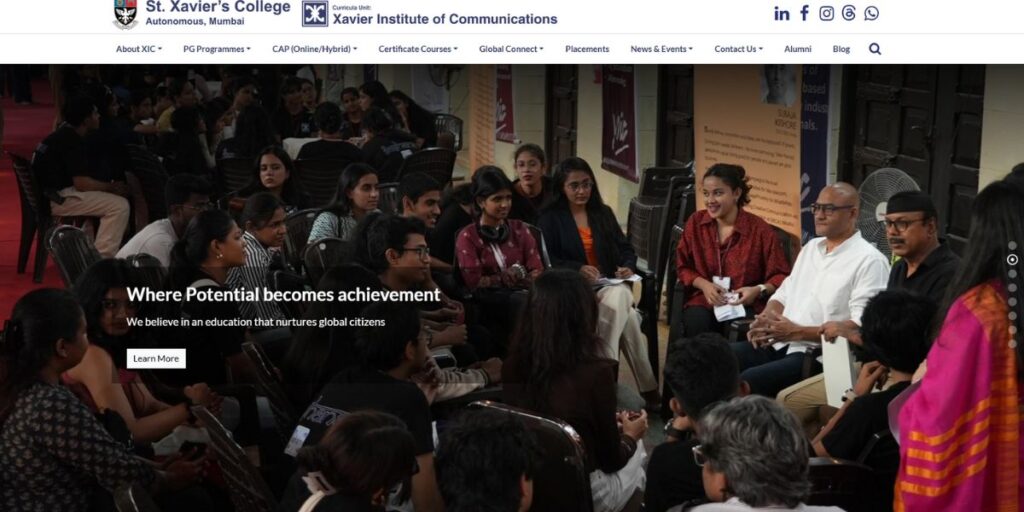
Xavier Institute of Communications, which began in 1959, is renowned for its effective media education in India. Being based in Mumbai, home of India’s entertainment industry, XIC gives unbeatable access to films, television, and advertising.
To effectively incorporate information about Female News Anchor in India it would need to be in a separate sentence or paragraph that introduces the topic, perhaps discussing the role of XIC graduates in news anchoring or the prominence of female news anchors in India in general If you’d like to integrate this idea, could you provide more context on what you’re trying to convey? For example, are you trying to say that XIC produces female news anchors, or are you just trying to transition to a new topic about news anchors in India?
Course Highlights:
- Post Graduate Diploma in Mass Communication
- Certificate courses in Journalism and Broadcasting
- Specialized programs in Advertising and Public Relations
- Documentary filmmaking workshops
- Digital media and social media management
- Community communication and development journalism
Course Fees: Annual fees range from ₹80,000 to ₹1,50,000 for diploma programs
Admission Process: Written test, group discussion, and personal interview
Top Recruiters: Times Network, Star India, Reliance Entertainment, Ogilvy, McCann Worldgroup, Hindustan Times
5. Symbiosis Institute of Media and Communication (SIMC), Pune
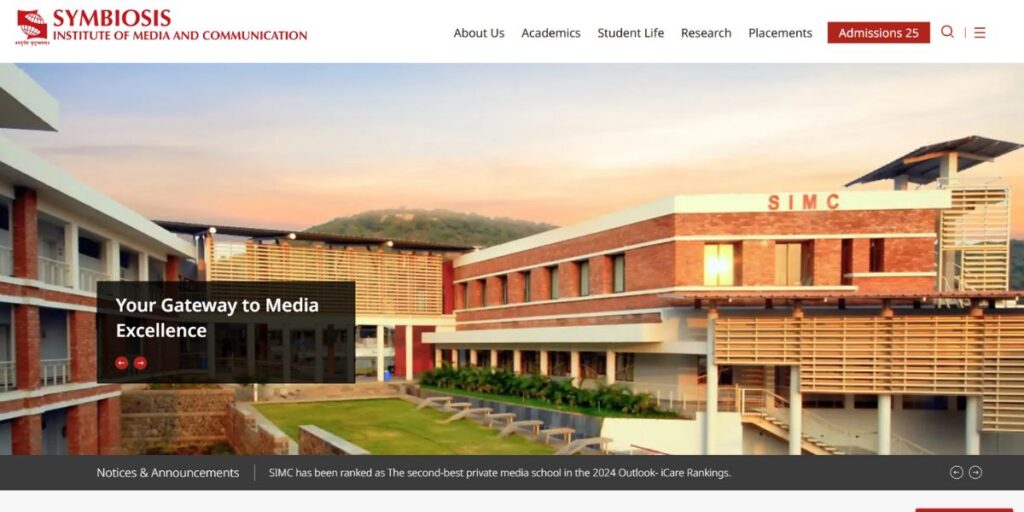
Symbiosis Institute of Media and Communication has made a name for itself as one of the best journalism colleges in India by using innovative teaching styles and industry-focused training. SIMC gives students the chance to study journalism, advertising, public relations, and digital media, preparing them for a wide range of jobs in today’s changing media field.
Since the institute incorporates practical and theoretical knowledge, its graduates are good at handling the challenges of modern media. SIMC is able to offer students a global view and local knowledge, thanks to its great infrastructure, exchange programs, and ties with leading industries.
Course Highlights:
- Bachelor of Arts in Journalism and Mass Communication
- Master of Arts in Communication and Journalism
- PhD programs in Media Studies
- Certificate courses in Digital Marketing
- International exchange programs with foreign universities
- Specialized workshops in Sports Journalism and Business Reporting
Course Fees: Annual fees range from ₹2,00,000 to ₹4,00,000 depending on the program level
Admission Process: Symbiosis Entrance Test (SET) followed by personal interview and group discussion
Top Recruiters: Zee Entertainment, Sony Pictures, Madison Communications, Mindshare, The Economic Times, Business Standard
6. Mudra Institute of Communications, Ahmedabad (MICA)

MICA, Ahmedabad, is one of the leading journalism colleges in India because of its emphasis on strategic communications and brand management. MICA has changed the way communication education is delivered by including advertising, journalism, and digital media with business and consumer knowledge. Students learn about the relationship between media, technology, and business because the institute’s curriculum is made by industry experts.
Because of its high-quality equipment, accomplished teaching staff, and impressive placement statistics, MICA helps students become leaders in advertising, media, digital marketing, and corporate communication areas.
Course Highlights:
- Post Graduate Diploma in Management (Communications)
- Specialized tracks in Brand Communication and Journalism
- Certificate programs in Digital Communications
- Executive education programs for working professionals
- Research opportunities in consumer behavior and media studies
- International immersion programs with global institutions
Course Fees: Annual fees range from ₹3,00,000 to ₹5,00,000 for flagship programs
Admission Process: CAT/XAT/GMAT scores followed by group exercise and personal interview
Top Recruiters: JWT, Leo Burnett, Publicis, GroupM, The Times of India, Hindustan Unilever, ITC Limited
7. Asian College of Journalism (ACJ), Chennai
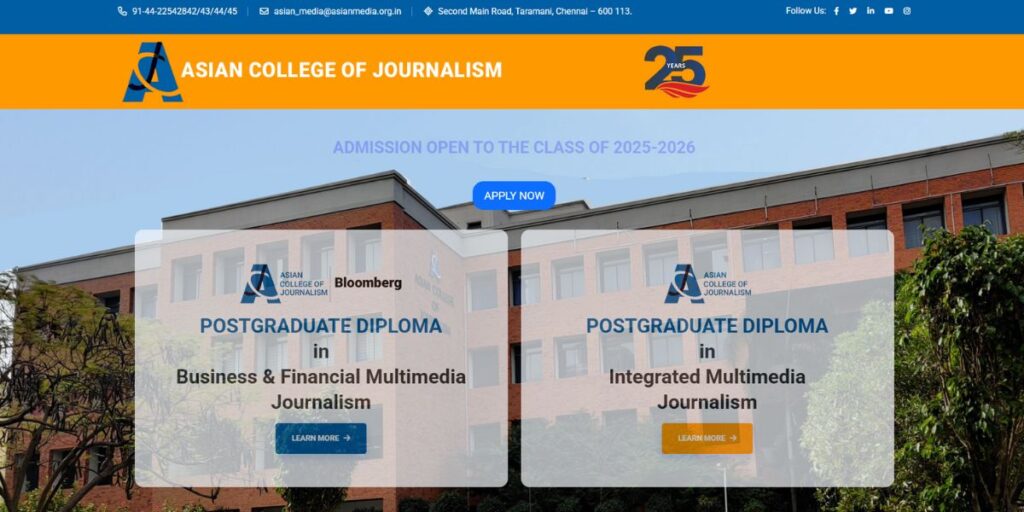
The Asian College of Journalism in Chennai has gained popularity because of its strong and industry-oriented journalism courses. ACJ is only involved in journalism education and gives trainees a solid experience like that of a real newsroom. At the college, students focus on investigative journalism, how to tell stories with different media, and mastering the skills needed for current journalism.
Since each batch is small, taught by expert professors, and supported by industry professionals, ACJ offers students unique opportunities and practical help. The focus on journalistic integrity and professionalism at the institution has resulted in graduates working for famous national and international media platforms.
Course Highlights:
- Post Graduate Diploma in Journalism
- Certificate courses in Broadcast Journalism
- Specialized programs in Digital Journalism
- Investigative journalism training modules
- Media entrepreneurship and startup guidance
- International journalism fellowship programs
Course Fees: Annual fees range from ₹4,50,000 to ₹6,00,000 for diploma programs
Admission Process: Written examination, current affairs test, and comprehensive interview process
Top Recruiters: Reuters, Bloomberg, The Wire, Scroll.in, The News Minute, Deccan Herald, India Today Group
8. Indian Institute of Journalism & New Media (IIJNM), Bangalore
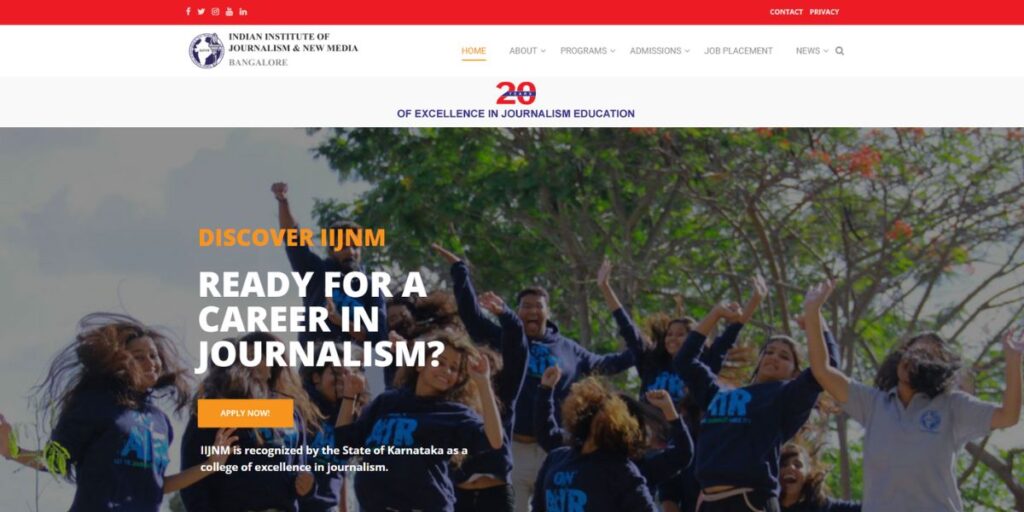
The Indian Institute of Journalism & New Media is recognized for its innovations because it focuses on digital journalism and new media technologies. IIJNM was the first to create curriculum focused on convergent journalism, social media reporting, and data journalism, preparing its students for the age of digital media. Entrepreneurial journalism, independent media ventures, and freelance career development are what make the institute unique compared to other journalism schools.
Students at IIJNM get the chance to learn with flexible courses, use industry-tailored lesson plans, and join a network of alumni working in the tech-related media field, helping them find opportunities in new media.
Course Highlights:
- Diploma in Journalism and New Media
- Certificate courses in Digital Marketing and Social Media
- Specialized training in Data Journalism and Fact-checking
- Media entrepreneurship and business development programs
- Freelance journalism and content creation workshops
- Technology integration in journalism practice
Course Fees: Annual fees range from ₹50,000 to ₹2,00,000 depending on program duration and type
Admission Process: Online application, portfolio submission, and telephonic interview
Top Recruiters: The Quint, Wire.in, Logical Indian, BuzzFeed India, Vice Media, independent media startups
9. Times School of Media (TSM), New Delhi

Times School of Media is known for its important position in the Best Journalism Colleges in India because it is directly connected to the industry and focuses on practical learning. Through TSM, students are able to learn from India’s biggest media group by taking part in internships and projects linked to Times Group channels and publications. The curriculum mixes the old skills of journalism with the new knowledge needed for digital media and online reporting.
Having professors who are experts in media and frequent interactions with industry leaders, TSM helps students become skilled in media and corporate communications while preserving the high standards of the Times Group.
Course Highlights:
- Post Graduate Programme in Journalism and Mass Communication
- Certificate courses in Digital Journalism and Content Writing
- Specialized programs in Brand Journalism and Corporate Communications
- Media analytics and audience research training
- Live project assignments with Times Group properties
- Industry mentorship and career guidance programs
Course Fees: Annual fees range from ₹3,50,000 to ₹4,50,000 for flagship programs
Admission Process: Written test focusing on current affairs, English proficiency, and personal interview
Top Recruiters: Times of India, Economic Times, Times Now, Mirror Group, Radio Mirchi, Zoom TV
10. Amity School of Communication, Noida

Through having state-of-the-art facilities and diverse courses, Amity School of Communication ranks as one of the country’s leading journalism colleges. The college’s programs in journalism, advertising, public relations, and digital media give students the ability to pick what they want to study. Amity makes sure that students get practical training, join international internships, and take part in various global programs, helping them grow professionally and view the world from different angles.
By employing experienced teachers, providing students with up-to-date resources, and working with many companies, the school leads students toward different communication jobs while ensuring high academic and ethical standards.
Course Highlights:
- Bachelor of Arts in Journalism and Mass Communication
- Master of Arts in Mass Communication with various specializations
- PhD programs in Communication and Media Studies
- Certificate courses in Event Management and Public Relations
- International study abroad and exchange programs
- Regular industry workshops and guest lecture series
Course Fees: Annual fees range from ₹1,50,000 to ₹3,00,000 depending on program level and specialization
Admission Process: Amity entrance exam or national level test scores followed by personal interview
Top Recruiters: Network18, India TV, Aaj Tak, Public Relations agencies, Digital marketing companies, Corporate communication departments
How to Choose the Right College
- Career Specialization Alignment: Find out your exact passion in journalism, be it investigative reporting, broadcasting, digital media, or corporate communications, and pick colleges that offer strong courses in that area.
- Faculty Expertise and Industry Experience: Check the backgrounds and previous experience of research faculty to find out if they have experience in journalism and are still working in the industry.
- Infrastructure and Technology Access: Look at the available resources like television studios, radio stations, editing suites, and newsroom simulations to ensure that these will help you gain practical experience.
- Placement Records and Alumni Success: Look into the statistics of where graduates find jobs, the average pay they receive, the kinds of organizations hiring them, and achievements of alumni working in the media and communications sector.
- Location and Industry Proximity: Look for colleges that are near media hubs such as Delhi, Mumbai, Bangalore, or Chennai, since they give you better access to internships and opportunities to interact with people in the industry.
- Financial Considerations and Scholarship Opportunities: Make sure to weigh the program expenses and potential income from it, and at the same time check out the available scholarships, financial aids, and education loans.
The Future of Journalism Education in India
- Digital Transformation Integration: Journalism schools are adding artificial intelligence, data analytics, virtual reality, and blockchain to their curriculum to prepare their students for working in digital-focused newsrooms and content creation using automation.
- Interdisciplinary Learning Approaches: Programs in journalism will soon combine knowledge from business, technology, psychology, and social sciences to help develop well-informed media experts.
- Entrepreneurial Journalism Focus: Universities and colleges are starting courses that focus on starting your own business in media, independent journalism projects, and using sustainable approaches for digital media startups and freelance careers.
- Global Perspective and Cross-Cultural Competency: Students will be taught how to report internationally, use different cultural communication styles, and understand global media trends to prepare them for the world’s media.
- Ethical Standards and Fact-Checking Emphasis: Worries about misinformation and false news have led journalism education to stress the importance of being media literate, checking facts, and upholding proper ethical standards so people trust the media.
- Specialized Niche Journalism Development: The next stage will include specialized training in climate journalism, health reporting, financial journalism, and technology reporting, to answer both the needs and expectations of the industry.
Conclusion
Since the media industry is always changing, journalism education in India also continues to adapt. The institutions included in this list have managed to adjust to new technology without forgetting the core beliefs and ethics of journalism. These institutions give students a strong knowledge base, hands-on experience, access to industries, and helpful connections in the field of journalism. Since digital media is changing the industry, anyone thinking about studying in these top universities should clearly consider their goals, what they want to learn, and how they like to learn.
Students at the Best Journalism Colleges in India can choose from many routes, such as print, broadcast, online, and entrepreneurial careers. The success of journalism education depends on the school and also on the students’ passion, interest, and willingness to act responsibly in the media. Their graduates keep shaping the media industry in India by being skilled, ethical, and innovative journalists who support democracy and the progress of society through their work in many media organizations across the country and worldwide.
READ ALSO : Top Indian Journalists
FAQs
What conditions do you have to meet to be admitted to the Best Journalism Colleges in India?
A large number of colleges expect a 10+2 qualification and at least 50% grade, but these rules are adjusted by the institution and level of study.
Which entrance tests are accepted by some of the best journalism colleges?
Some of the famous entrance tests are DUET for Delhi University, JMI entrance for Jamia, and individual exams for IIMC.
How much do journalism programs usually cost in India on average?
The fees for government colleges start at ₹15,000 per year, but in top private institutes, they may be as high as ₹6,00,000.
What job paths open up after getting a journalism education?
They have career options in print media, TV, radio, digital journalism, corporate communications, public relations, and freelance jobs.
Do you get help finding a job after finishing at the leading journalism colleges in India?
Yes, leading colleges have placement cells that are well connected with businesses, allowing about 80-95% of their students to get jobs after graduation.

